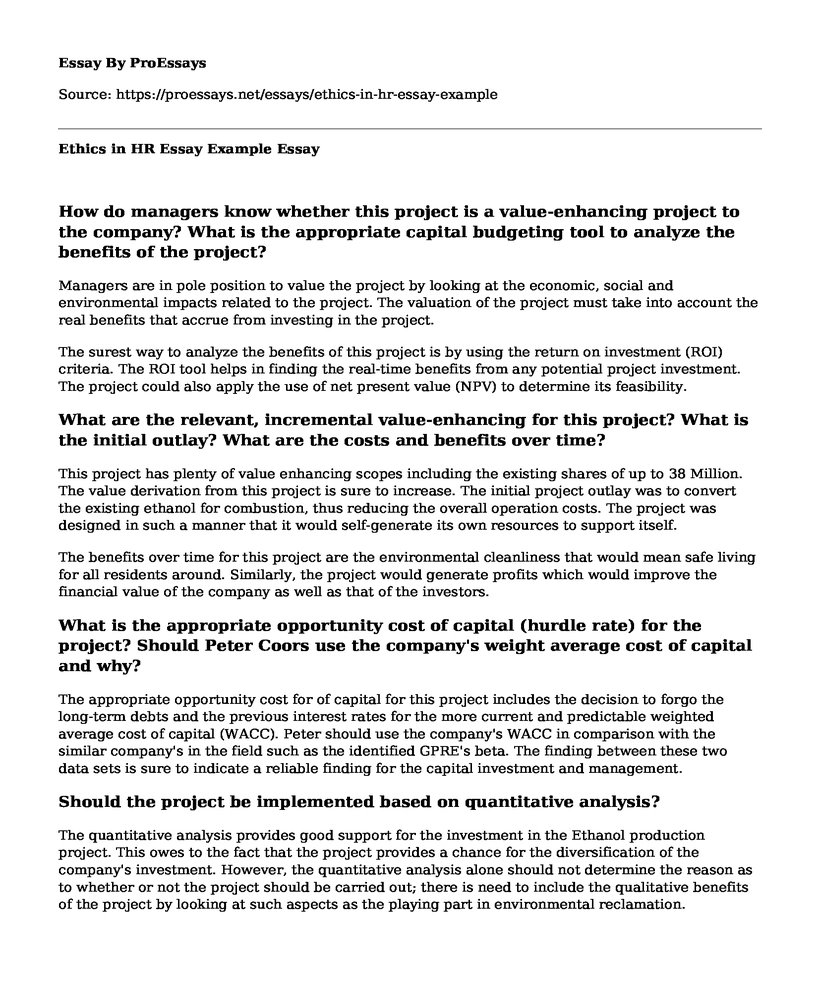How do managers know whether this project is a value-enhancing project to the company? What is the appropriate capital budgeting tool to analyze the benefits of the project?
Managers are in pole position to value the project by looking at the economic, social and environmental impacts related to the project. The valuation of the project must take into account the real benefits that accrue from investing in the project.
The surest way to analyze the benefits of this project is by using the return on investment (ROI) criteria. The ROI tool helps in finding the real-time benefits from any potential project investment. The project could also apply the use of net present value (NPV) to determine its feasibility.
What are the relevant, incremental value-enhancing for this project? What is the initial outlay? What are the costs and benefits over time?
This project has plenty of value enhancing scopes including the existing shares of up to 38 Million. The value derivation from this project is sure to increase. The initial project outlay was to convert the existing ethanol for combustion, thus reducing the overall operation costs. The project was designed in such a manner that it would self-generate its own resources to support itself.
The benefits over time for this project are the environmental cleanliness that would mean safe living for all residents around. Similarly, the project would generate profits which would improve the financial value of the company as well as that of the investors.
What is the appropriate opportunity cost of capital (hurdle rate) for the project? Should Peter Coors use the company's weight average cost of capital and why?
The appropriate opportunity cost for of capital for this project includes the decision to forgo the long-term debts and the previous interest rates for the more current and predictable weighted average cost of capital (WACC). Peter should use the company's WACC in comparison with the similar company's in the field such as the identified GPRE's beta. The finding between these two data sets is sure to indicate a reliable finding for the capital investment and management.
Should the project be implemented based on quantitative analysis?
The quantitative analysis provides good support for the investment in the Ethanol production project. This owes to the fact that the project provides a chance for the diversification of the company's investment. However, the quantitative analysis alone should not determine the reason as to whether or not the project should be carried out; there is need to include the qualitative benefits of the project by looking at such aspects as the playing part in environmental reclamation.
Would changes of the assumptions about the demand for the ethanol, hourly wages, rack price of ethanol and operational efficiency affect the value of the project? How sensitive are the results to the assumptions made?
Any changes in the assumptions about the market parameters like the demand, wages, and operational efficiency would deal a deathly blow to the feasibility of the entire project. The cost of the project could skyrocket would there be an increment in the wages and lower demand. The sensitivity analysis, therefore, makes it rather easy for the determination and to provide the go-ahead as to whether go ahead with the project or leave it altogether.
In addition to the financial analysis, what qualitative factors should be considered prior to making the final decision on the approval of the project?
The overall value of the project is not entirely embedded on the financial benefits of the project. In any case, there is sufficient qualitative aspect such as the reduction of the VOC emissions which, then, would mean the saving of up to $33.00 for every tC of carbon emitted. The environmental aspect is a great determinant in the overall running of the project.
What conclusion can managers make about the perceived tradeoff of doing well and doing good?
There is a thin line between doing well and doing good. This case study provides a sufficient basis for managers to realize that doing well whole not be the only drive for investing in a business, but doing good as well should be a factor. The decision as to invest or to abort entirely is driven by the social responsibility that a business entity owes its consumers as well as the society around it. Managers should at times forgo the financial importance of projects for its qualitative value. Such is the case of the Ethanol investment; the decision to invest should not be entirely determined by the financial benefits that arise from it, but the environmental benefits as well as the health benefits that it will provide to the society; that is doing good.
Cite this page
Ethics in HR Essay Example. (2022, Nov 07). Retrieved from https://proessays.net/essays/ethics-in-hr-essay-example
If you are the original author of this essay and no longer wish to have it published on the ProEssays website, please click below to request its removal:
- Ethical Standards to Obtain Ethics Approval
- The Importance of Soft Skills - Essay Example
- Essay Sample on Gibbs Reflection About the Job Interview
- Paper Example on Information System: Key to Organizational Performance
- Job Satisfaction & Organizational Justice: A Study of UAE Employees - Essay Sample
- My Work: Submitting Project Analysis & Tables/Figures - Essay Sample
- Paper Example on Constructing an Effective Team: Selecting the Right People







